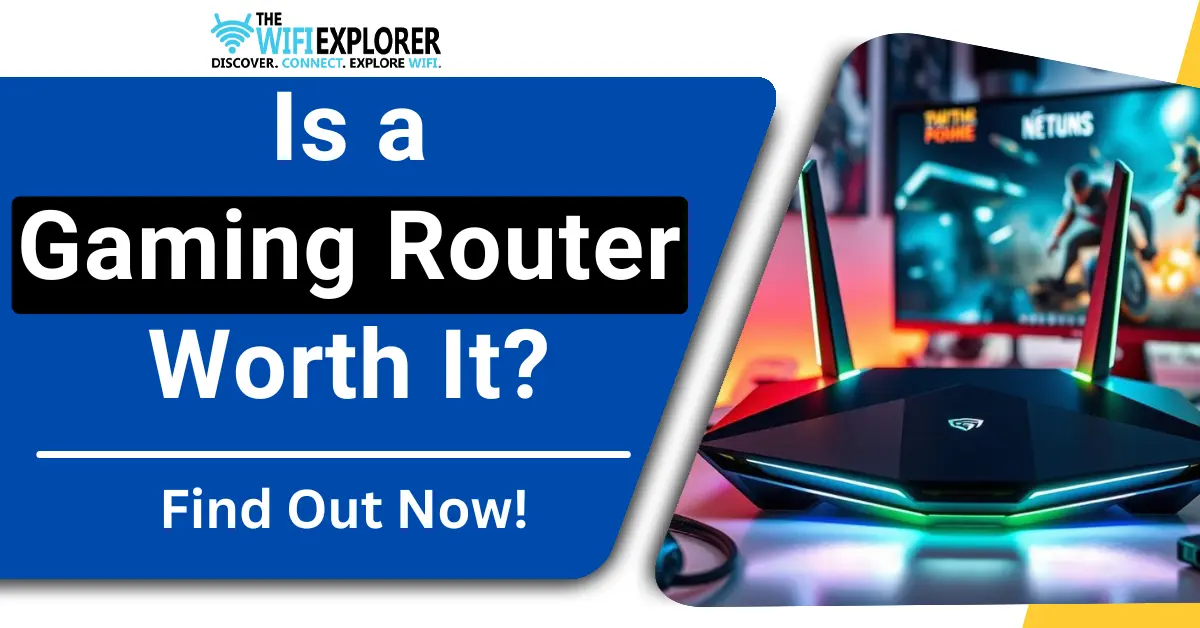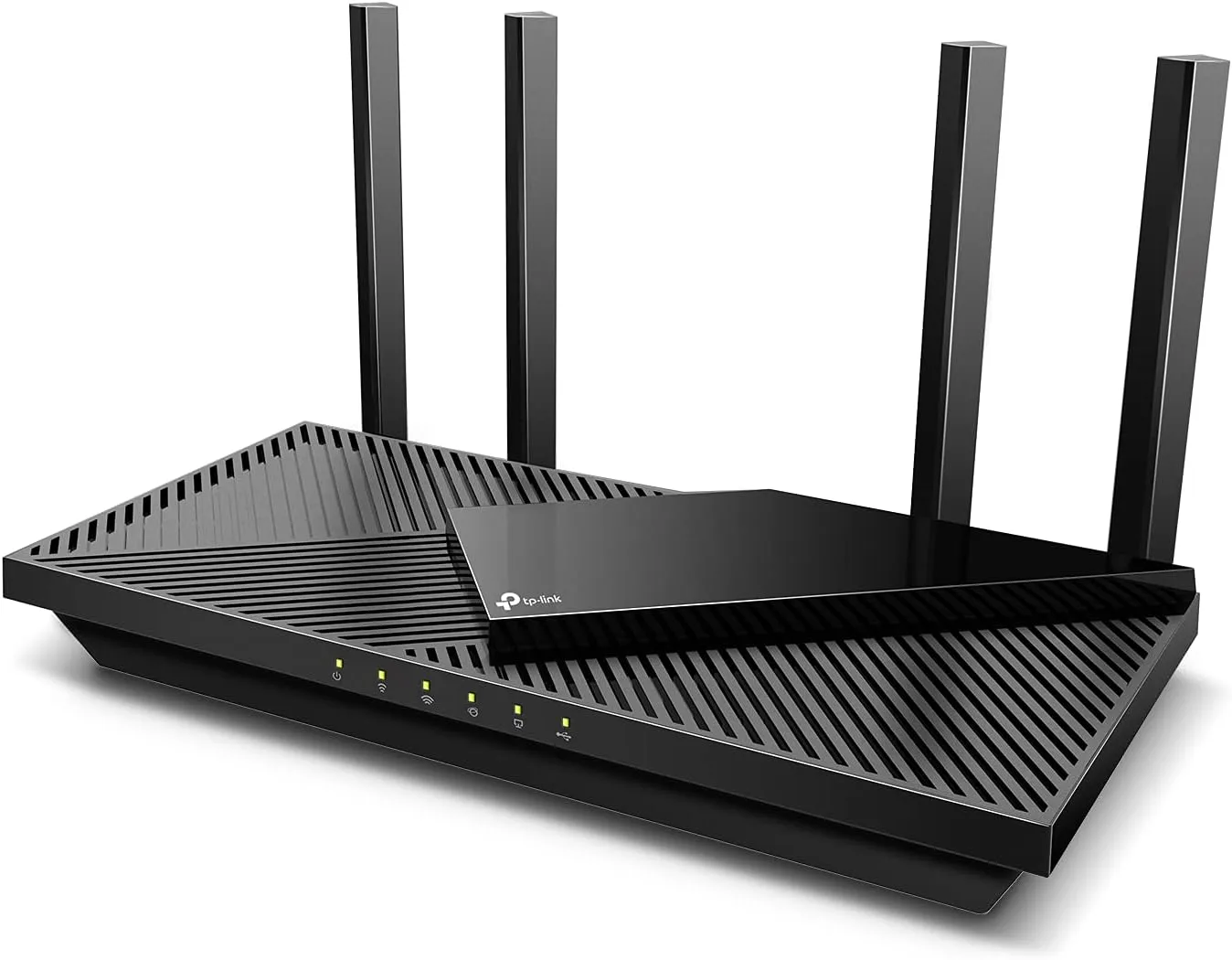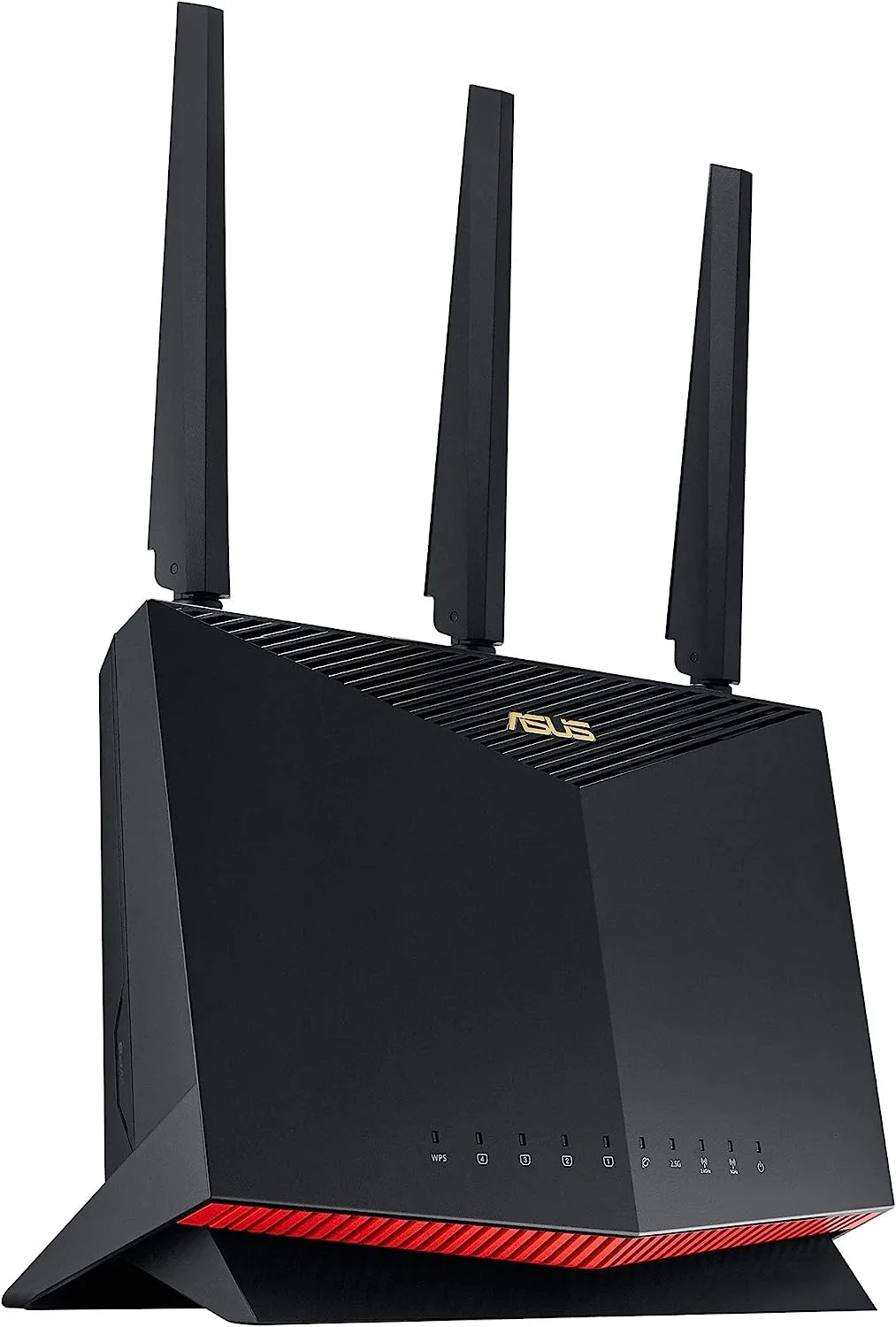Last Updated: 7 months ago | John Miller

When a friend recently asked for router recommendations, I didn’t start by asking about his budget. Instead, I posed a simple question: “What will you use it for? Just streaming, web surfing, or gaming?”
His answer, “Gaming and Streaming”, led me to suggest a gaming router. The response was instant skepticism: “Is a gaming router worth it?”
He argued that why splurge on a premium model when standard routers “work fine” without the flashy designs and RGB lights?
But here’s the catch: Gaming isn’t just about connecting to the internet; it’s about dominating it. Competitive play demands near-zero latency, rock-solid stability, and bandwidth that won’t crumble under the pressure of 4K streams or multiple devices.
Can features like traffic prioritization, advanced Quality of Service (QoS), and multi-device optimization truly justify the extra cost, or are these routers just overhyped gadgets for enthusiasts?
In this article, we’ll cut through the marketing noise. By dissecting real-world performance, hidden drawbacks, and the actual value of gaming-specific features, we’ll answer the important question: Does a gaming router deserve your cash, or should you stick with the basics?
Let’s settle the debate once and for all.
Key Takeaways
- Understanding the significance of internet speed in gaming.
- Identifying key features that make gaming routers unique.
- Evaluating personal gaming needs before investing.
- Assessing the benefits of improved connection stability.
- Examining top gaming router options available today.
Affiliate Disclaimer
Some links in this post are affiliate links, meaning, at no additional cost to you, we may earn a commission if you click through and make a purchase. As an Amazon Associate, I earn from qualifying purchases.What Makes a Router a “Gaming Router”?
Let’s break down the tech that separates gaming routers from their basic counterparts. Think of Gaming Routers as the sports cars of the networking world, built for speed, precision, and handling high-pressure scenarios that would leave standard models lagging.
While your average router focuses on simply getting devices online, gaming routers are fine-tuned to dominate tasks like crushing latency in Fortnite or maintaining a butter-smooth 4K stream while your roommate binge-watches Netflix.
But what exactly gives these routers their edge?
From traffic prioritization wizardry to battlefield-ready stability, here are the features that define a true gaming router—and why they matter.
Key Features
- Quality of Service (QoS): This feature acts as a VIP bouncer for your internet traffic, prioritizing gaming data over other devices. Imagine your Call of Duty session bypassing your roommate’s Netflix stream—no more lag mid-headshot.
- Multi-Band Support: Gaming routers often use dual or tri-band Wi-Fi (2.4GHz, 5GHz, and even 6GHz) to reduce congestion. Think of it as adding extra lanes to a highway during rush hour.
- Low Latency Tech: Built to minimize ping spikes and packet loss, these routers ensure your actions in games like Fortnite or Valorant translate instantly online.
- Aesthetic Design: From aggressive, angular casings to customizable RGB lighting, gaming routers scream “gamer gear”, even if looks don’t boost performance.
Gaming vs. Standard Routers: The Difference
| Feature/Aspect | Gaming Routers | Standard Routers |
|---|---|---|
| Traffic Prioritization | QoS optimizes gaming traffic | Basic or no QoS settings |
| Bands | Dual/Tri-band (less congestion) | Often single or dual-band |
| Latency | Optimized for minimal ping spikes | Higher latency under heavy use |
| Customization | Advanced settings (VPN, port forwarding) | Limited customization options |
| Design | RGB lighting, “gamer” aesthetics | Plain, utilitarian designs |
| Price | $150–$500+ | $50–$150 |
In short, gaming routers are built to win, not just connect. But do you need that edge? Let’s weigh the pros and cons.
The Case FOR Gaming Routers
Let’s cut to the chase: Gaming routers aren’t just flashy accessories—they’re weapons in the battle against lag, buffering, and outdated tech. If you’re serious about dominating leaderboards or streaming like a pro, here’s why these routers earn their keep:
Pro #1: Lag-Free Gaming
Picture this: You’re one shot away from clutching a Valorant round when suddenly—your screen freezes. With a gaming router, that nightmare becomes a relic of the past. Thanks to Quality of Service (QoS), your game’s data skips the line ahead of Netflix binges, Zoom calls, or TikTok scrolls.
How it works: QoS acts like a traffic cop for your internet, prioritizing gaming packets so your headshot lands before your opponent’s. In Fortnite, that could mean building a wall faster than a storm surge. In Call of Duty, it’s the difference between a killcam highlight and respawning in shame.
“Imagine your bullet registering first—not because of reflexes, but because your router gave you the edge.”
Pro #2: Stability for Streaming
Gaming routers aren’t just for fragging noobs—they’re for streamers who multitask like pros. Try running a Twitch stream while playing Apex Legends on a standard router, and you’ll face buffering, dropped frames, or worse—chat roasting your “internet issues.”
How it works: With dual/tri-band Wi-Fi, gaming routers carve out dedicated lanes for 4K streams, Discord chats, and gameplay. Think of it as a highway where your stream gets the HOV lane, while Netflix gets stuck in traffic.
“Stream Apex Legends on Twitch while your roommate binge-watches Stranger Things? No sweat. No buffering. No rage.”
Pro #3: Future-Proofing
Wi-Fi 6 and 6E aren’t just jargon—they’re your ticket to staying ahead of the curve. Gaming routers with these specs don’t just handle today’s games; they’re built for tomorrow’s 8K streams, VR marathons, and smart homes packed with 20+ devices.
How it works:
- Wi-Fi 6/6E: Delivers speeds up to 9.6 Gbps (yes, that’s 9,600 Mbps) and reduces congestion in crowded networks.
- Gigabit-ready: Perfect for fiber-optic plans that’ll make your old ISP plan look like dial-up.
“Ready for next-gen games, 8K Netflix, and a smart home that’s more connected than your group chat.”
The Case AGAINST Gaming Routers
Let’s keep it real: Gaming routers aren’t for everyone. While they’re built to dominate, they come with trade-offs that could make you regret dropping that extra cash. Here’s why you might want to tap the brakes:
Con #1: High Cost
Gaming routers scream “premium” in every way—including their price tags. While a standard router might set you back $50–$150, gaming models often start at $150 and skyrocket to $500+ for tri-band Wi-Fi 6E beasts.
The real question: Is a 10ms latency drop worth paying 3x more? If you’re casually farming in Stardew Valley or playing offline RPGs, that price gap could buy you a new game (or three).
“Why pay Ferrari prices for a Honda Civic commute?”
Con #2: Overkill for Casual Use
Gaming routers are like flamethrowers at a birthday party—awesome in the right context, but massive overkill for basic tasks. If your idea of gaming is Minecraft on weekends or Among Us with friends, a standard router will handle it just fine.
The reality check:
- Small households with 1-2 devices won’t tax a basic router.
- Web surfing, YouTube, and casual gaming don’t need traffic prioritization.
- That RGB lighting won’t make your Zoom calls any smoother.
“You don’t need a tactical nuke to swat a fly.”
Con #3: Complexity
Gaming routers pack more settings than a NASA control panel. Features like port forwarding, VPN configurations, and QoS tweaks can overwhelm anyone who just wants to plug-and-play.
The struggle:
- Non-tech users might drown in menus labeled “Adaptive QoS” or “AiProtection.”
- Firmware updates and security protocols demand regular tinkering.
- That “gamer aesthetic” won’t help when you’re Googling “how to reset my router” at 2 AM.
“If you’ve ever rage-quit a settings menu, this might not be for you.”
The Bottom Line
Gaming routers deliver split-second wins for competitive play, buttery-smooth streaming, and future-ready tech for tomorrow’s demands. However, they’re overkill for casual gamers, minimalists, or anyone who’d rather spend $300 on games than router specs.
But the million-dollar question remains: “Is a gaming router worth it for YOU?” (Spoiler: It depends.)
Is a Gaming Router Worth It?

Let’s drop the tech jargon and get real: A gaming router isn’t a magic bullet—it’s a strategic upgrade. After dissecting the pros and cons, the verdict hinges on two questions: What do you play? And what’s your setup?
Here’s the no-BS breakdown:
Worth It If…
- You’re Grinding Ranked Matches:
- Playing Call of Duty, League of Legends, or Apex Legends? QoS ensures your shots/stuns/ults land first. Lag isn’t just annoying—it’s career-limiting.
- Your Household is a Bandwidth Warzone:
- Streaming 4K while gaming? A gaming router is your peace treaty. No more buffering mid-Elden Ring boss fight because someone fired up Disney+.
- You’re Prepping for Tomorrow’s Tech:
- Wi-Fi 6/6E and gigabit internet aren’t luxuries—they’re inevitabilities. Future-proof now or pay double later.
“If your router is the bottleneck in your setup, it’s time to upgrade.”
Not Worth It If…
- You Play Casual/Offline Games:
- Stardew Valley, Hades, or Skyrim? A standard router handles these like a champ. Save your cash for Steam sales.
- Your Current Router Works Fine:
- If Zoom calls don’t drop and Netflix streams smoothly, don’t fix what isn’t broken.
- Your Budget Screams “Responsible Adult”:
- Dropping $200+ for a 10ms latency boost is like buying a Lamborghini for grocery runs. Priorities, people.
Final Verdict:
| Feature | Standard Router | Gaming Router |
|---|---|---|
| Traffic Prioritization | No / Basic traffic management | Yes / Advanced QoS prioritizes gaming data |
| Latency Management | No optimization; higher ping spikes | Advanced optimization (reduces ping/packet loss) |
| Device Handling | Struggles with 5+ devices | Optimized for 10+ devices + 4K streams |
| Connection Stability | Moderate (may drop under load) | High (stable even during peak usage) |
| Customization | Limited settings | Extensive (VPN, port forwarding, etc.) |
| Price | $50–$150 | $150–$500+ |
“Yes, if you’re chasing leaderboards or juggling 4K streams. No, if you’re a casual gamer or budget-conscious.”
Still torn? Let’s simplify:
- Competitive gamers/streamers → Worth it. 🎯
- Casual gamers/minimalists → Skip it. 💸
Buyer’s Guide: What to Look For
Choosing a gaming router isn’t about specs—it’s about matching features to your needs. Between marketing hype and budget traps, it’s easy to overspend on unnecessary Wi-Fi 6E or skimp on crucial QoS. This guide cuts through the noise, spotlighting must-haves, budget gems under $150, and when premium upgrades matter. Arm yourself wisely.
Must-Haves
- QoS Customization:
- What it is: It lets you manually prioritize gaming traffic over other devices.
- Why it matters: Without QoS, your Fortnite match buffers when someone streams Netflix.
- Look for: Terms like “Gaming Mode” or “Device Prioritization” in settings.
- Wi-Fi 6 Support:
- What it is: The latest Wi-Fi standard (802.11ax), offering faster speeds and less congestion.
- Why it matters: Handles 4K streaming, Zoom calls, and gaming simultaneously.
- Bonus: Backward-compatible with older devices, so no need to upgrade everything.
- Multi-Device Optimization:
- What it is: Smoothly juggles 10+ devices without slowdowns.
- Why it matters: Stops your smart fridge from hogging bandwidth during a Call of Duty session.
- Look for: Features like MU-MIMO (sends data to multiple devices at once) or OFDMA (splits channels for efficiency).
Nice-to-Haves
- Built-in VPN:
- What it is: Encrypts your connection and lets you bypass geo-restrictions.
- Why it matters: Play Warzone on foreign servers or shield against DDoS attacks.
- Ideal for: Competitive gamers and privacy nerds.
- Anti-DDoS Protection:
- What it is: Blocks malicious traffic aimed at crashing your connection.
- Why it matters: Prevents salty rivals from booting you offline mid-Rocket League match.
- Look for: Routers labeled “Gaming Grade Security” or “Anti-Malware.”
- User-Friendly App:
- What it is: Simplifies setup and settings tweaks via your phone.
- Why it matters: No need to decode router hieroglyphics—update firmware or prioritize devices in seconds.
- Top picks: ASUS AiMesh, NETGEAR Nighthawk, or TP-Link Tether apps.
Gaming Router: Budget vs. Premium Picks

The right router isn’t about spending the most—it’s about spending smart. Just like you wouldn’t buy a racing wheel for Animal Crossing, you don’t need a $500 router for casual gaming. Let’s break down the tiers:
Under $150
The TP-Link Archer AX55 is the MVP here. It nails Wi-Fi 6 and basic QoS, perfect for casual gamers or small households who just want lag-free Minecraft sessions or smooth Zoom calls.
“Why we love it: Reliable, no-frills performance that won’t make your wallet cry.”
Mid-Range $150–$300
This tier is the sweet spot for competitive gamers and streamers. Look for adaptive QoS (like ASUS’s AiProtection) and tri-band support to crush lag spikes while streaming Apex Legends. The ASUS RT-AX86U dominates here, balancing raw power with features that actually matter.
Premium $300+
Reserved for Wi-Fi 6E, tri-band wizardry, and 8K streaming. The NETGEAR Nighthawk RAXE500 is a beast, but only hardcore streamers or smart home hoarders with 20+ devices need this tier. For everyone else? It’s like buying a Ferrari for grocery runs—cool, but unnecessary.
Summary
- Casual Gamers: Stick to budget/mid-range. Save the cash for Steam sales.
- Competitive Players: Mid-range routers offer the best bang-for-buck.
- Streamers/Tech Enthusiasts: High-end makes sense if you’re pushing 8K or future-proofing.
Top Gaming Router Recommendations
Cutting through the hype, these routers deliver where it counts—proven performance, no fluff.
Budget Pick: TP-Link Archer AX55

Pros
- Affordable Wi-Fi 6 performance.
- Basic QoS for lag-free gaming.
- Easy setup.
Cons
- Limited customization.
- No tri-band support.
Ideal for: Casual gamers and small households.
Why we recommend it: Reliable Wi-Fi 6 and basic QoS for casual gamers on a budget.
We earn a commission if you make a purchase, at no additional cost to you.
Mid-Range Beast: ASUS RT-AX86U

Pros
- Adaptive QoS auto-prioritizes gaming traffic.
- 2.5G port for future-proof speeds.
- AiProtection security.
Cons
- Pricier than basic models.
- Slightly complex for non-tech users.
Ideal for: Competitive gamers and streamers.
Why it’s great: Adaptive QoS dynamically prioritizes gaming traffic, even if your roommate starts a 4K stream mid-match.
We earn a commission if you make a purchase, at no additional cost to you.
Premium Powerhouse: NETGEAR Nighthawk RAXE500

Pros
- Affordable Wi-Fi 6 performance.
- Basic QoS for lag-free gaming.
- Easy setup.
Cons
- Limited customization.
- No tri-band support.
Ideal for: Tech enthusiasts and large smart homes.
Why it’s worth it: Wi-Fi 6E and tri-band support for large smart homes and 8K streaming.
We earn a commission if you make a purchase, at no additional cost to you.
Why These Picks?
Each router targets specific needs—no filler, just real-world results. Match your habits to the tier, and game on.
Conclusion
So, is a gaming router worth it? The answer hinges on balancing three pillars: performance needs, budget, and future-proofing.
For competitive gamers, features like QoS and multi-device optimization are non-negotiable—they ensure split-second reactions in Valorant or Call of Duty aren’t ruined by lag.
Streamers benefit from rock-solid stability, juggling 4K broadcasts and gameplay without buffering.
Casual players, however, can skip the premium price tag; a standard router handles Stardew Valley or web surfing just fine.
Meanwhile, tech enthusiasts eyeing Wi-Fi 6/6E should invest now to avoid upgrades later.
Bottom line: Match your router to your habits, not the hype.
Final Verdict:
“Yes, if you’re a competitive gamer or heavy streamer. No, if you play casually or prioritize budget over performance.”
Gaming Router FAQs
Can’t I just use a regular router with an Ethernet cable?
Ethernet helps, but gaming routers optimize wireless traffic for multiple devices.
Do gaming routers work for consoles like PS5/Xbox?
Yes—they’re excellent for reducing lag on consoles.
How long do gaming routers typically last?
3-5 years, depending on tech advancements and usage.
Do gaming routers work with older devices?
Absolutely. They’re backward compatible, but you’ll miss out on newer features like Wi-Fi 6 speeds.
Is Wi-Fi 6 worth the upgrade over Wi-Fi 5?
If you’re gaming in a crowded network or streaming 4K, yes. For casual use, Wi-Fi 5 still holds up.
Does a pricier router always mean better performance?
Not always. A $500 router won’t help if you’re just playing Animal Crossing. Match specs to your needs, not your ego.
Got more questions? Drop them below or follow me for honest tech reviews! Let’s turn your setup into a lag-slaying machine.